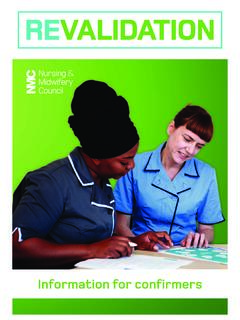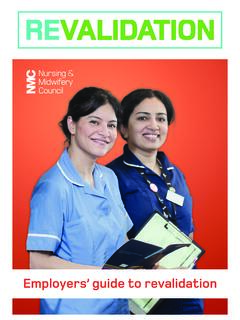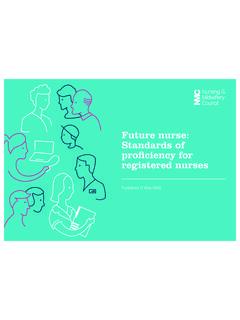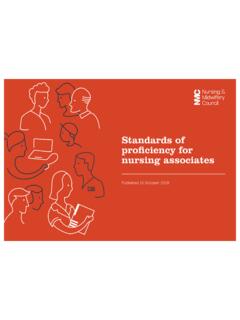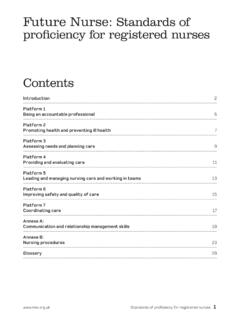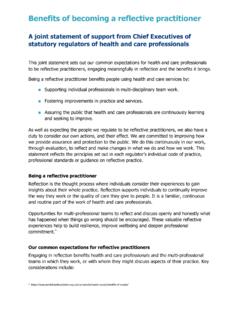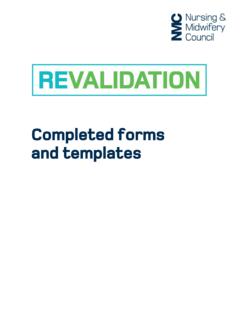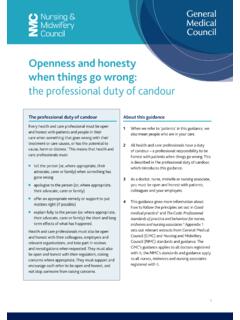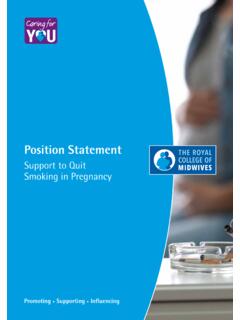Transcription of The Code for nurses and midwives - Nursing and Midwifery ...
1 The Code Professional standards of practice and behaviour for nurses and midwives Introduction The Code contains the professional standards that registered nurses and midwives must uphold. UK nurses and midwives must act in line with the Code, whether they are providing direct care to individuals, groups or communities or bringing their professional knowledge to bear on Nursing and Midwifery practice in other roles, such as leadership, education or research. While you can interpret the values and principles set out in the Code in a range of different practice settings, they are not negotiable or discretionary.
2 Our role is to set the standards in the Code, but these are not just our standards. They are the standards that patients and members of the public tell us they expect from healthcare professionals. They are the standards shown every day by good nurses and midwives across the UK. When joining our register, and then renewing their registration, nurses and midwives commit to upholding these standards. This commitment to professional standards is fundamental to being part of a profession. We can take action if registered nurses or midwives fail to uphold the Code.
3 In serious cases, this can include removing them from the register. The Code should be useful for everyone who cares about good Nursing and Midwifery : Nursing and Midwifery Council Patients and service users, and those who care for them, can use it to provide feedback to nurses and midwives about the care they receive. nurses and midwives can use it to promote safe and effective practice in their place of work. Employer organisations should support their staff in upholding the standards in their professional Code as part of providing the quality and safety expected by service users and regulators.
4 Educators can use the Code to help students understand what it means to be a registered professional and how keeping to the Code helps to achieve that. For the many committed and expert practitioners on our register, this Code should be seen as a way of reinforcing their professionalism. Through revalidation, you will provide fuller, richer evidence of your continued ability to practise safely and effectively when you renew your registration. The Code will be central in the revalidation process as a focus for professional reflection.
5 This will give the Code significance in your professional life, and raise its status and importance for employers. The Code contains a series of statements that taken together signify what good Nursing and Midwifery practice looks like. It puts the interests of patients and service users first, is safe and effective, and promotes trust through professionalism. The Code 3. Prioritise people You put the interests of people using or needing Nursing or Midwifery services first. You make their care and safety your main concern and make sure that their dignity is preserved and their needs are recognised, assessed and responded to.
6 You make sure that those receiving care are treated with respect, that their rights are upheld and that any discriminatory attitudes and behaviours towards those receiving care are challenged. 1 Treat people as individuals and uphold their dignity To achieve this, you must: treat people with kindness, respect and compassion make sure you deliver the fundamentals of care effectively avoid making assumptions and recognise diversity and individual choice make sure that any treatment, assistance or care for which you are responsible is delivered without undue delay, and respect and uphold people's human rights.
7 2 Listen to people and respond to their preferences and concerns To achieve this, you must: work in partnership with people to make sure you deliver care effectively The fundamentals of care include, but are not limited to, nutrition, hydration, bladder and bowel care, physical handling and making sure that those receiving care are kept in clean and hygienic conditions. It includes making sure that those receiving care have adequate access to nutrition and hydration, and making sure that you provide help to those who are not able to feed themselves or drink fluid unaided.
8 Nursing and Midwifery Council recognise and respect the contribution that people can make to their own health and wellbeing encourage and empower people to share decisions about their treatment and care respect the level to which people receiving care want to be involved in decisions about their own health, wellbeing and care respect, support and document a person's right to accept or refuse care and treatment, and recognise when people are anxious or in distress and respond compassionately and politely. 3 Make sure that people's physical, social and psychological needs are assessed and responded to To achieve this, you must.
9 Pay special attention to promoting wellbeing, preventing ill health and meeting the changing health and care needs of people during all life stages recognise and respond compassionately to the needs of those who are in the last few days and hours of life act in partnership with those receiving care, helping them to access relevant health and social care, information and support when they need it, and act as an advocate for the vulnerable, challenging poor practice and discriminatory attitudes and behaviour relating to their care.
10 4 Act in the best interests of people at all times To achieve this, you must: balance the need to act in the best interests of people at all times with the requirement to respect a person's right to accept or refuse treatment The Code 5. make sure that you get properly informed consent and document it before carrying out any action keep to all relevant laws about mental capacity that apply in the country in which you are practising, and make sure that the rights and best interests of those who lack capacity are still at the centre of the decision-making process, and tell colleagues.
